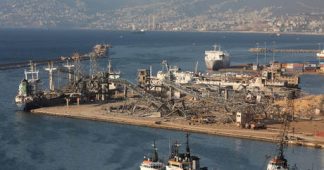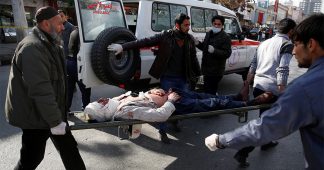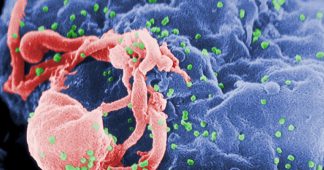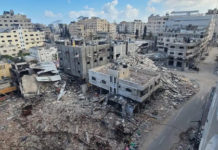Exclusive interview with Political Scientist and university lecturer from Beirut Marwa Osman
Aug.6, 2020
How does Lebanon recover from the explosion in the Beirut warehouse, in what condition is the Lebanese nation now?
Lebanese capital in state of chaos as people grapple with scale of the blast. Walking down through the east Beirut suburb of Ashrafieh to Gemmayze to Musaitbeh and towards the site of the blast at the port, the devastation is even more comprehensive. Dozens of buildings clearly sustained structural damage. Shops, and restaurants are almost all severely damaged. Weeks of sustained artillery shelling had not caused the same amount of ruin, even during the peak of the civil war.
I don’t think we can ever recover, especially that this blast came in the middle of an unprecedented economic crisis and hospitals struggling to contain the coronavirus pandemic.
Which versions dominate the expert community, what is the reason? Was it due to negligence or sabotage?
Officials have said it was caused by the detonation of chemicals stored there, without saying whether it was an accident or an attack. 2750 tons of confiscated ammonia nitrate were hoarded in 2013/2014 at Beirut’s port 12, where impact with a spark or fire produced what was possibly the largest chemical explosion after Hiroshima. There is some speculation, that, over time, that smuggled ammonium was illegally sold, possibly also as explosive substance to blow up mountains to extract limestone for Lebanon’s robust illegal quarrying business.
Everybody has a different theory. The blast wave was felt as far away as south Beirut, and was heard from 80km away. There were reports that the sound of the explosion was even heard 250km to the west in Cyprus. Though the source of the blast remains unconfirmed, most of the evidence so far points to government negligence, and many Lebanese seem to agree.
Why did US President Donald Trump say there was an “attack” on a Lebanese port? Why aren’t the country’s official authorities talking about it?
Pentagon officials as saying there was no evidence of any attack, raising the question of where Trump got his information. Lebanese officials were reported to have sought urgent clarification from US diplomats.
There was no information as to whether Trump had received a top secret intelligence briefing, had seen something on Twitter, but as far as we know Trump, someone must have said something in front of him which led him to parrot a conversation he had with that someone. Anything is possible, Beirut is overflowing with intelligence agencies so how hard could it be for the Mossad to plant a bomb?
Also, negligence is the title of the Lebanese government so this also could have been all an accident. Only further investigators could get us closer to what caused the blast.
How will the explosion affect the already difficult economic and social situation in Lebanon? Will it lead to an even greater dependence on external centres and aid providers from abroad?
The huge explosion is a crippling blow to a country that had been reeling from a political and financial crisis, a depreciating currency and the Covid-19 pandemic. It’s hard to imagine the financial cost of this disaster, it is in the billions. The port is completely destroyed, and much of the city is damaged. Who will pay for the reconstruction of Beirut? Beirut port is the country’s main logistics hub and its deepest sea port. The disaster will have a dramatic impact on food security. Bread prices were already up, spiking food prices will go up further, and 50 percent of Lebanese are under the poverty line. The port was the beating heart of the country as it provided around 80 percent of imported goods, which kept the economy moving.
The closure of the port threatens food security in the country, which is import reliant for an estimated 85 percent of food needs. Some 15,000 tons of wheat had been stored at the port’s silos were all destroyed.This will sure lead to an even greater dependence on foreign players and aid providers from abroad, but this time the entire globe is stricken with financial difficulties and we might not be able to find someone to help us out.
What are the political implications for Lebanon given the recent protests in the country and the death of the Secretary-General of the Kataib party in the bombing?
There’s anger on the streets of Beirut after the explosion with a quarter of the Hiroshima nuclear bomb’s power ripped the city apart. I think as the mourning phase passes anger will fester especially if the government was not able to arrest those involved and hold them accountable. The government did mandate the Lebanese army command to force those involved into house arrest but people are asking if former ministers will be held responsible and if not then the streets will ignite. The death of the secretary general of the Kataib party is the same as the death of any other Lebanese citizen in this blast, tragic and by pure chance.
Are the enemies of Lebanon (Zionists, terrorists, West) taking advantage of this tragedy? What should the Lebanese and the people of the region as a whole prepare for?
They sure are and if they don’t then we will be shocked. Most Persian gulf arab states keep slipping the word “Hezbollah” in their headlines which just proves how pathetic their media is but also a lot of Zionist media tried claiming that the explosion occurred in one of Hezbollah’s weapon warehouses, which is beyond ridiculous. Everybody knows that this area of Beirut is not under the influence of the resistance, on the contrary the resistance usually avoids being around this area because as I said before it is an area festering with scores of intelligence agencies from all over the world.
The Lebanese people should prepare for a wave of a hard hitting pandemic along with further plummeting of their lira to the dollar after this blast.
What measures are the public and political forces in Lebanon currently taking to deal with the consequences of the tragedy?
The government declared a two-week state of emergency in Beirut after the massive blast. President Michel Aoun has decided to release 100 billion Lebanese pounds in emergency allocations from the 2020 budget. The government also recommended that a committee be tasked with investigating the blast and present its findings within five days to mete out the maximum punishment for those responsible. The Lebanese Information Minister said the state of emergency will last for two weeks effective as of Aug. 4 with possibility to be extended. As for the consequences, it remains to be seen because the ambiguity behind how the government will manage this catastrophe is still at its highest levels.
Published at https://uwidata.com/13064-dr-marwa-osman-theres-anger-on-the-streets-of-beirut-after-the-explosion/











